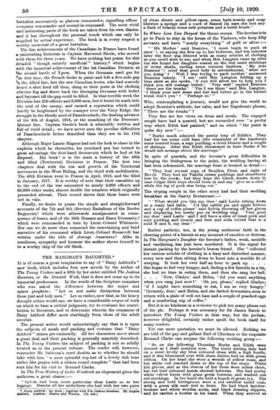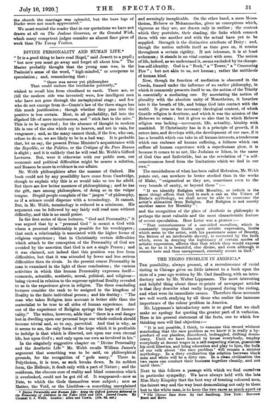THE HANGMAN'S DAUGHTER.*
Jr is of course a great temptation to say of "Daisy Ashford's" new book, which includes four new novels by the author of The Young Visiters and a fifth by her sister entitled The Jealous Govern-es, or the Granted Wish, that it does not come up to its immortal predecessor. In the words of the Scripture examinee who was asked the difference between the major and minor prophets : "Let us not make distinction between these just and holy men." Let us rather, now that, as the heavy draught critics would say, we have a considerable corpus of work on which to base a critical judgment, try to evaluate her contri- bution to literature, and to determine wherein the romances of Daisy Ashford differ most startlingly from those of the adult novelist.
The present writer would unhesitatingly say that it is upon the subjects of meals and packing and costume that "Daisy Ashford" shines pre-eminently. All her characters move about a great deal, and their packing is generally minutely described. In The Young Visiters the subject of packing is not so solidly treated as in the present volume. The reader will, however, remember Mr. Salteena's cruel doubts as to whether he should take with him a most splendid top-hat of a lovely rich tone rather like grapes with a ribbon round complete" that had been sent him for his visit to Bernard Clarke.
In The True History of Leslie Woodcock an elopement gives the authoress a great chance :—
"Sylvia had been more particular than Leslie as to her luggage. Besides all her underlinen she had with her two pairs • Daisy Ashford: her Book ; together with The Jealous Governer. By Angela Ashford. London : Chatto and \Vilnius. 17s. net.]
of clean sheets and pillow-eases, some bath-towels and soap likewise a sponge and a yard of flannel (in case she lost any a flask of brandy some new potatoes and a tooth brush."
In Where Love Lies Deepest the theme recurs. The heroine is to
go to Paris to stay in the house of the Vindsors, who keep fifty servants and have "nearly everything" of gold or silver :—
"'Oh Mother' said Beatrice, I must begin to pack at once' !, so saying she flew up to her bedroom, and ten mmutes later the floor was littered with as many articles of clothing as you could wish to see, and when Mrs. Langton came up after tea she found her daughter seated on the bed amid stockmgs of every shade, curling some crimson feathers. My dear Beatrice' I cried that good lady in astonishment, 'what are you doing ' ? 'Well I was trying to pack mother' answered Beatrice calmly. I see ' said Mrs. Langton folding up a blue skirt as she spoke, if you will allow me to help you I think you will manage better.' 'Very well' replied Beatrice 'there are the trunks.' 'Yes I see them' said Airs. Langton,
I think your new dress and hat had better go in the basket trunk don't you ' ? 'Perhaps so.'"
Who, contemplating a journey, would not give the world to adopt Beatrice's attitude, her calm, and her Napoleonic phrase, "There are the trunks" ?
Very fine are her views on dress and meals. The engaged couple have had a quarrel, but are reconciled over "a pretty tray which Edith had painted," and on which "the paint is quite dry now" :—
" Burke much admired the pretty tray of Edith's. They had for tea some cold ham (the remainder of the luncheon) some toasted buns, a sago pudding, a dried bloater and a couple of shrimps. After this Edith threatened to hate Burke if he would not arrange about the marriage."
In spite of quarrels, and the heroine's great difficulties in bringing the bridegroom to the point, the wedding having at last been solemnized, the marriage feast is treated in detail :— "They had several cups of Bouillon Fleet, and eight of Bovril. They had six Vanilla cream puddings and strawberry ices by the scoie ; but they kept the blinds drawn down in case vulgar little boys should loom in and say give us a slice' while the leg of pork was being cut."
The eloping couple in the other story had had their wedding breakfast a the Gaiety Restaurant What would you like my dear' said Leslie sitting down
at a ready laid table. I'd like rabbit pie and apple fritters and a cup of coffee please' said Sylvia throwing off her gloves and displaying her newly put on Ntedcling ring. Very good my dear' said Leslie and I will have a slice of roast pork and suet pudding and treacle and beer and soda mixed that is a mild B. and S, my dear.'"
Rather pathetic, too, is the young authoress' faith in the cheering power of a biscuit at any moment of emotion or distress.
In The Hangman's Daughter the heroine's father, weak, amiable and vacillating, has just been murdered. It is the signal for instant packing by the heroine's bosom friend. She "collected her various articles of clothing in a hazy and disturbed manner, every now and then sitting down to burst into a terrible fit of weeping. It took her over half an hour to pack up. . . .
She began to feel very hungry, and, finding a few biscuits in a tin, she lost no time in eating them, and then she rang her bell. . . . 'Now, Gladys,' said Helen, 'did you want anything when you rang just now ? " Oh yes, please,' replied Gladys; 'if I might have something to eat, I am so very hungry.' 'Certainly, dear,' said Helen, and she darted downstairs, soon to return with a plate of well cut ham and a couple of poached eggs and a comforting cup of coffee."
But it is no kindness in a reviewer to pick too many plums out of the pie. Perhaps it was necessary for Sir James Barrie to introduce The Young Visiters in that way, but the preface, however delightful, certainly rather spoilt the book itself for many readers.
Yet one more quotation we must be allowed. Nothing we are told of the gay and gallant Earl of Clincham or the exquisite Bernard Clarke can surpass the following wedding group :—
"So on the following Thursday Burke and Edith were dressed as I shall mention now. The timid darling lady had on a most lovely sky blue coloured dress with a high bustle, and it was blossomed over with sham daisies tied on with green ribbon. On her head she wore a wreath of yellow roses, and her white veil reached down to the top of her stays. White kid gloves, and as the sleeves of her dress were rather short, her red beef coloured hands showed between. She had pretty white velvet boots with grass green buttons, and washed out red stockings. In her hand she held a bunch of green ivy. The strong and bold bridegroom wore a red swallow tailed coat, with a green silk sash tied in front. He had black knicker- bockers and white woollen socks, and black dressing slippers, and he carried a bowler in his hand. When they arrived at
the church the marriage was splendid, but the bare legs of Burke were not much appreciated."
We must remind the reader that in our quotations we have not drawn at all on The Jealous Governes, or the Granted Wish, which many competent judges consider an almost finer piece of work than The Young Visiters.



































 Previous page
Previous page